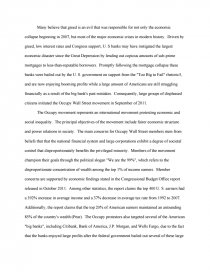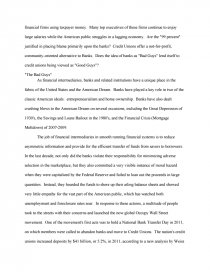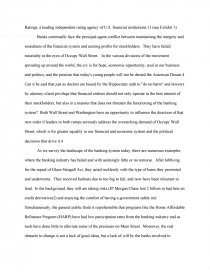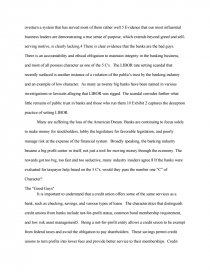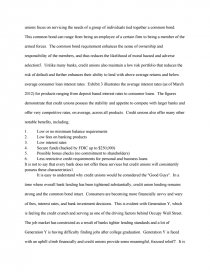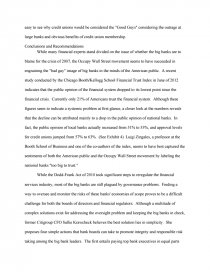Wall Street Case
Essay by throckmo • April 30, 2013 • Case Study • 2,287 Words (10 Pages) • 1,540 Views
Many believe that greed is an evil that was responsible for not only the economic collapse beginning in 2007, but most of the major economic crises in modern history. Driven by greed, low interest rates and Congress support, U. S banks may have instigated the largest economic disaster since the Great Depression by lending out copious amounts of sub-prime mortgages to less-than-reputable borrowers. Promptly following the mortgage collapse these banks were bailed out by the U. S. government on support from the "Too Big to Fail" rhetoric5, and are now enjoying booming profits while a large amount of Americans are still struggling financially as a result of the big bank's past mistakes. Consequently, large groups of displeased citizens initiated the Occupy Wall Street movement in September of 2011.
The Occupy movement represents an international movement protesting economic and social inequality. The principal objectives of the movement include fairer economic structure and power relations in society. The main concerns for Occupy Wall Street members stem from beliefs that that the national financial system and large corporations exhibit a degree of societal control that disproportionately benefits the privileged minority. Members of the movement champion their goals through the political slogan "We are the 99%", which refers to the disproportionate concentration of wealth among the top 1% of income earners. Member concerns are supported by economic findings stated in the Congressional Budget Office report released in October 2011. Among other statistics, the report claims the top 400 U. S. earners had a 392% increase in average income and a 37% decrease in average tax rate from 1992 to 2007. Additionally, the report claims that the top 20% of American earners maintained an astounding 85% of the country's wealth (Pear). The Occupy protestors also targeted several of the American "big banks", including Citibank, Bank of America, J.P. Morgan, and Wells Fargo, due to the fact that the banks enjoyed large profits after the federal government bailed out several of these large financial firms using taxpayer money. Many top executives of these firms continue to enjoy large salaries while the American public struggles in a lagging economy. Are the "99 percent" justified in placing blame primarily upon the banks? Credit Unions offer a not-for-profit, community-oriented alternative to Banks. Does the idea of banks as "Bad Guys" lend itself to credit unions being viewed as "Good Guys"?
"The Bad Guys"
As financial intermediaries, banks and related institutions have a unique place in the fabric of the United States and the American Dream. Banks have played a key role in two of the classic American ideals: entrepreneurialism and home ownership. Banks have also dealt crushing blows to the American Dream on several occasions, including the Great Depression of 1930's, the Savings and Loans Bailout in the 1980's, and the Financial Crisis (Mortgage Meltdown) of 2007-2009.
The job of financial intermediaries in smooth running financial systems is to reduce asymmetric information and provide for the efficient transfer of funds from savers to borrowers. In the last decade, not only did the banks violate their responsibility for minimizing adverse selection in the marketplace, but they also committed a very visible instance of moral hazard when they were capitalized by the Federal Reserve and failed to loan out the proceeds in large quantities. Instead, they hoarded the funds to shore up their ailing balance sheets and showed very little empathy for the vast part of the American public, which has watched both unemployment and foreclosure rates soar. In response to these actions, a multitude of people took to the streets with their concerns and launched the now global Occupy Wall Street movement. One of the movement's first acts was to hold a National Bank Transfer Day in 2011, on which members were called to abandon banks and move to Credit Unions. The nation's credit unions increased deposits by $41 billion, or 5.2%, in 2011, according to a new analysis by Weiss Ratings, a leading independent rating agency of U.S. financial institutions.11 (see Exhibit 1)
Banks continually face the principal-agent conflict between maintaining the integrity and soundness of the financial system and earning profits for stockholders. They have failed miserably in the eyes of Occupy Wall Street. In the various divisions of the movement sprouting up around the world, the cry is for hope, economic opportunity, soul in our business and politics, and the promise that today's young people will not be denied the American Dream.4 Can it be said that just as doctors are bound by the Hippocratic oath to "do no harm" and lawyers by attorney-client privilege that financial entities should not only operate in the best interest of their stockholders, but also in a manner that does not threaten the functioning of the banking system? Both Wall Street and Washington have an opportunity to influence the direction of that new order if leaders in both camps seriously address the overarching demand of Occupy Wall Street, which is for greater equality in our financial and economic system and the political decisions that drive it.4
As we survey the landscape of the banking system today, there are numerous examples where the banking industry has failed and with seemingly little or no remorse. After lobbying for the repeal of Glass-Steagall Act, they acted recklessly with the type of loans they promoted and underwrote. They received bailouts due to too big to fail, and now have been reluctant to lend. In the background, they still are taking risks (JP Morgan Chase lost 2 billion in bad bets on credit derivatives2) and enjoying the comfort of having a government safety net. Simultaneously, the general public finds it reprehensible that programs like the Home Affordable Refinance Program (HARP) have had low participation rates from the banking industry and as such have done little to alleviate some of the pressures on Main Street. Moreover, the real obstacle to change is not a lack of good ideas, but a lack of will by the banks involved to overturn a system that has served most of them rather well.5 Evidence that our most influential business leaders are demonstrating a true sense of purpose, which extends beyond greed and self-serving motive, is clearly lacking.4 There is clear evidence that the banks are the bad guys. There is an accountability and ethical obligation to maintain integrity in the banking business, and most of all possess character as one of the 5 C's. The LIBOR rate setting scandal that recently surfaced is another instance of a violation of the public's trust by the banking industry and an
...
...
